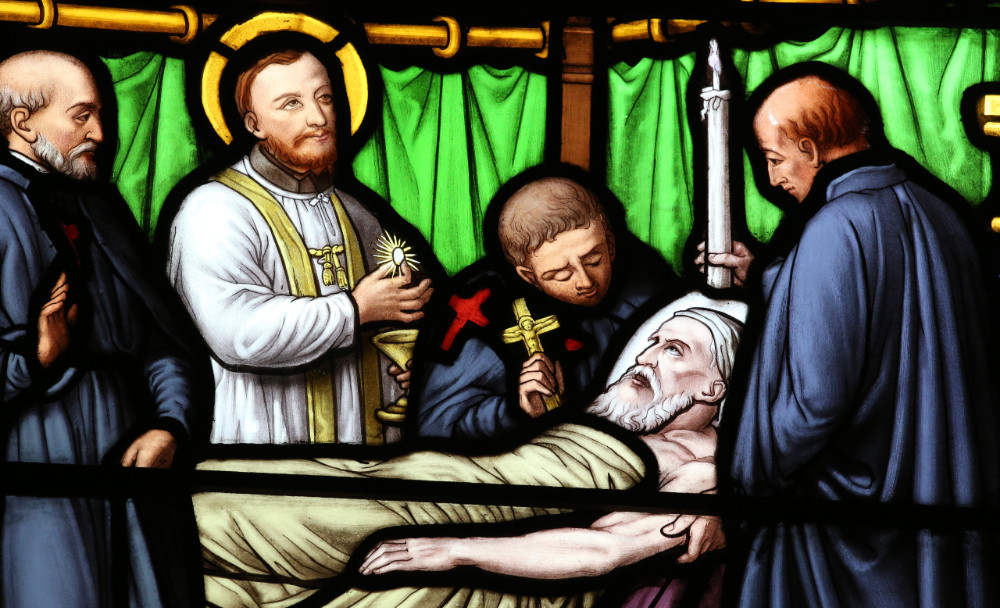To reflect on the last things, one of which is death, is a longstanding Catholic custom. This is not a pleasant subject, but it is good to consider our final end and how we prepare for it. As the old saying goes, memento mori (remember death).
One great gift that the Church gives to us when death is near is the apostolic blessing or apostolic pardon. This blessing comes with a plenary indulgence, which means the recipient is granted the remission of all the temporal punishment due to sin already forgiven. The Church teaches that priests should not fail to impart this blessing on the dying and that the faithful should be instructed about it. Even if the dying person has already received a plenary indulgence this is the one time they can receive another on the same day. The Code of Canon Law entrusts this responsibility especially to the pastor (Canon 530.3), but any priest can and should offer it to those in danger of death. Normally, only the pope can grant a plenary indulgence with his blessing, but this is one of the times any priest has that same power. If he should forget, the faithful are encouraged to request this special blessing to their dying loved ones.
If a priest is not available, the Church still grants to the dying the opportunity to receive the plenary indulgence at the moment of death. This is granted to those who have been in the habit of reciting some prayers during their lifetime. In this case, the Church supplies for the three conditions required for a plenary indulgence namely sacramental confession, holy Communion, and prayers for the pope. The use of a crucifix or cross is highly recommended. It is the earnest desire of the Church to offer this indulgence is the broadest way possible to those who are in danger of death.
There are two forms of the apostolic blessing in the Church rites for the dying:
A. “Through the holy mysteries of our redemption may almighty God release you from all punishments in this life and in the life to come. May he open to you the gates of paradise and welcome you to everlasting joy.”
B. “By the authority which the Apostolic See has given me, I grant you a full pardon and the remission of all your sins in the name of the Father, and of the Son, and of the Holy Spirit.”
Often the apostolic pardon is given in the context of what is referred to commonly as the “last rites.” This consists principally of viaticum, which is holy Communion as “food for the journey,” and the commendation of the dying, although confession and anointing of the sick may be administered then, too. At the moment of death, the Church is present to offer the sacraments so at that pivotal time Christ’s grace and presence is near.
The rite called the Commendation of the Dying is intended to “help sustain the union of the soul with Christ until it is brought to fulfillment after death.” It expresses the desire for God’s mercy and confidence in Christ. Others who are present can join in the prayers and assist the person at their last moments. These prayers can help and give consolation, especially if the person is suffering from fear.
Scripture and a litany of the saints prepare for a prayer of commendation where the priest or another minister entrusts the soul of the dying to God and invokes his mercy. For some, it gives permission for them to let go and accept their death. It concludes with the Hail Holy Queen where we ask for Mary’s prayers to help the soul at the hour of death. This rite can be very helpful and should not be omitted if at all possible.
Once death has occurred, the same rite has a section of prayers after death. These consist of psalms and some ancient prayers for the dead. These prayers commend the soul to God and ask for forgiveness for his or her sins. In addition, we pray for the family and friends of the deceased. The body may be sprinkled with holy water as a final blessing.
Death is perhaps the most difficult moment in our lives. The Church provides the apostolic pardon and other rites to help us prepare for death and our particular judgment. They can give us a sense of peace and serenity. We can experience the hope given by Christ who has conquered death by his death and shares with us his eternal life.
Father James Goodwin is judicial vicar of the Diocese of Fargo.

